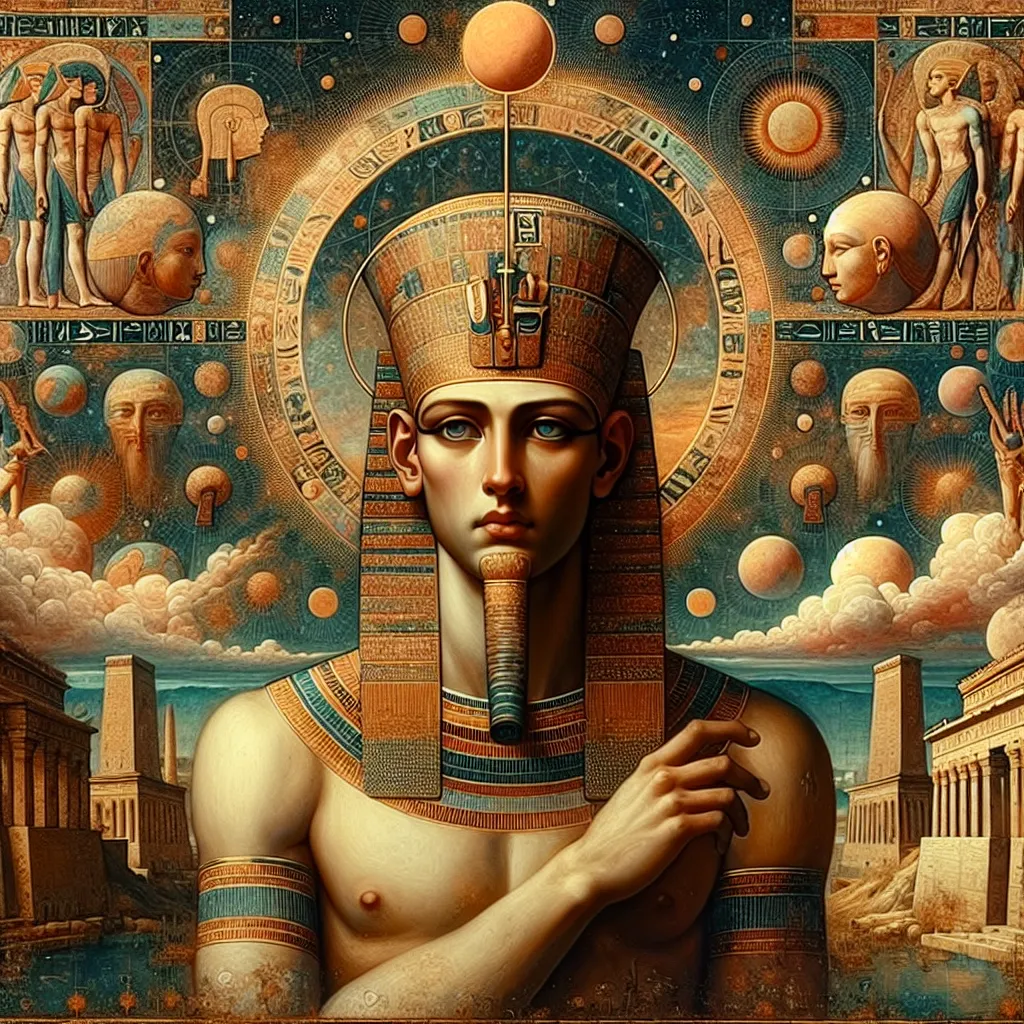
- Published on
- Authors

- Name
- You
The Breath of Osiris: Regeneration and Renewal in Egyptian Mythology
In the vast and intricate tapestry of Egyptian mythology, few deities hold as central a role as Osiris, the god of the afterlife, resurrection, and regeneration. The legend of Osiris, his murder, dismemberment, and subsequent resurrection by his wife Isis, offers profound insights into ancient Egyptian beliefs about life, death, and the eternal cycle of renewal.
The Myth of Osiris: An Overview
Osiris, originally a prominent deity associated with civilization and the Nile's fertility, became the focal point of a rich body of myths and religious practices. His narrative is complex and multi-layered:
| Step | Description |
|---|---|
| Death | Osiris is deceitfully murdered by his brother Set, who dismembers his body and scatters the pieces across Egypt. |
| Reassembly | Isis, with the help of her sister Nephthys and the god Anubis, gathers the fragments of Osiris's body and reassembles them. |
| Revival | With powerful incantations and divine breath, Isis revives Osiris, who then becomes the ruler of the afterlife. |
This mythic arc underscores Osiris's transformation from a living king to a resurrected deity, symbolizing the regenerative powers inherent in the natural world and the cosmos.
The Symbolic Role of Breath
In Egyptian mythology, breath is a profound symbol of life, spirit, and divine essence. The breath of Osiris, administered by Isis, is not merely a physical reanimation but a transference of spiritual energy, imbued with the power to transcend death.
The Mystical Significance of Breath
- Breath as Life Force: In various ancient traditions, including the Egyptian, the act of breathing is synonymous with life itself. The life force, often referred to as ka in Egyptian belief, is sustained through the breath.
- Divine Breath: The breath administered by Isis represents divine intervention, a sacred act that bridges the mortal and the divine realms.
- Regeneration and Renewal: Osiris's breath signifies regeneration—his rebirth into immortality—and serves as a metaphor for the human soul's potential for renewal after death.
Modern Scientific Perspectives
The Physiology of Breath
Breathing, from a scientific standpoint, is the process of air exchange in the lungs, essential for cellular respiration and energy production. Here’s a breakdown of the steps:
| Step | Process |
|---|---|
| Inhalation | Oxygen-rich air enters the lungs, where oxygen is transferred to blood. |
| Transport | Oxygenated blood circulates through the body, delivering oxygen to cells. |
| Exhalation | Carbon dioxide is expelled from the body, clearing metabolic byproducts. |
Breath and Regeneration
Contemporary research reveals that controlled breathing techniques can promote physiological and psychological well-being:
- Cellular Renewal: Oxygen is critical for cellular metabolism and regeneration.
- Stress Reduction: Breath control practices, such as those found in yoga and meditation, activate the parasympathetic nervous system, promoting relaxation and reducing stress.
- Mind-Body Connection: Breathwork fosters a deeper connection between the mind and body, echoing ancient practices that combined spiritual and physical health.
Bridging Science and Mysticism
The story of Osiris and the role of breath therein brilliantly illustrates how ancient mysticism and modern science can intersect. The regenerative power of breath, as recognized by Egyptians, is validated by scientific studies highlighting its vital role in sustaining life and promoting health.
By understanding the symbolic and physiological aspects of breath, we gain a holistic view of its significance:
| Aspect | Mystical Perspective | Scientific Perspective |
|---|---|---|
| Life Force | Spirit and spiritual energy | Oxygen for cellular metabolism |
| Divine Connection | Sacred breath as a connection to the divine | Enhanced mental states through controlled breathing techniques |
| Regeneration | Rebirth and renewal of the soul | Physical healing and stress reduction via breath control |
Conclusion
The breath of Osiris encapsulates a timeless truth, resonating across the millennia from the ancient sands of Egypt to modern scientific laboratories: the intrinsic power of breath as a force of life, regeneration, and renewal. This duality, bridging mysticism and science, illuminates the profound interconnectedness of all things—life, death, and the perpetual cycle of rebirth.
Embracing this ancient wisdom, while understanding its scientific underpinnings, allows us to cultivate a richer, more nuanced appreciation of the forces that sustain and rejuvenate life, echoing the eternal breath of Osiris in our own lives.
